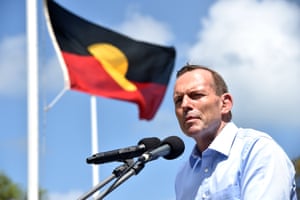Abbott as Indigenous affairs envoy? Be disturbed. Be very disturbed
Cometh the hour, cometh the return of the mission master
As the infighting within the federal Liberal party last week deteriorated into Friday’s high-noon leadership spill, the levels of anxiety among Aboriginal political observers continued to escalate. Ultimately, a pair of hardline rightwing cabinet ministers in Peter Dutton and Scott Morrison were vying for the role of running the country, each with a political record that did not augur well for improvement in the government’s consideration of Indigenous affairs.
Generally, over half of the Australian populace sighed with relief when the result went to Morrison instead of Dutton. Certainly, government spinners and moderate “small-l” liberals assured all within earshot that calamity had been averted. But First Nations onlookers recognised the two were cut from the same cloth. Now, with Tony Abbott accepting the role of special envoy to the new prime minister on Indigenous affairs, our immediate misgivings have been fully realised.
It’s ironic that the bloke essentially tipped out of the big chair in 2015 for a series of poor decision-making is now, as the “captain’s pick” of Australia’s latest PM, welcomed back into the cabinet fold of the federal government. For Morrison’s decision to appoint Abbott to that role is every bit as tone-deaf as Abbott’s 26 January 2015 decision as the then PM to bestow upon Prince Phillip, Duke of Edinburgh, husband to the Queen of England, resident of the United Kingdom, and an abiding symbol of a bloody colonial empire, the controversially reintroduced Knight of the Order of Australia.
Overnight, it emerged that after some deliberation around what he might bring to the role (read: how the gig could potentially yield enough political capital for a full-blown return tilt at the frontbench), Abbott accepted. Be disturbed. Be very disturbed.
A slew of articles have been published since the offer was announced explaining precisely why the nomination of Abbott was offensive to blackfellas. Just to reiterate: Abbott as PM – despite that whole Mabo decision thing – asserted that Australia was unoccupied at the time of white invasion; described pre-invasion Australia as “extraordinarily basic and raw”; stated precolonial Sydney was “nothing but bush” before the arrival of the First Fleet in 1788; and suggested white invasion was a positive, “defining moment”. But put those comments aside for a moment.
In 2015, again as PM, Abbott advocated for the forced closure of around 150 remote Indigenous communities in the state of Western Australia, remarking that taxpayers should not “subsidise lifestyle choices”. Rebukes from his own Aboriginal advisory council ensued, as did mass protests around the country.
The tension fuelling those demonstrations stemmed from the Abbott government’s 2014 budget and the implementation of the Indigenous advancement strategy, which ripped over $530m in funding from frontline, essential Indigenous services while Abbott paid lip service to closing the gap on Indigenous disadvantage and inequality.
Another $145m, including $46m in Indigenous health, was cut the following year as the bloke who previously described himself as the “Prime Minister for Aboriginal Affairs” oversaw the centralisation of the management of Indigenous expenditure into the Department of Prime Minister and Cabinet. That strategy of consolidation in the pursuit of boosting the federal budget’s bottom line continues to cost Aboriginal lives.
Abbott is wrong for the job, but his boss, Morrison, is himself too paternalistic to bother much about it. In both men there is a hulking paternal arrogance.
Morrison’s image has, in recent years, been purposefully “softened” from hardline right ideologue to a conservative, centrist, flexible politician. The glossies and fawning news media would have the Australian public view Morrison as their daggy uncle who’s popped into the backyard to get the barbie fired up and the drinks on ice in time for footy finals in September. But make no mistake, his form-line in terms of neocolonialism is right on par with Abbott’s. No amount of spruiking for the Sharks NRL team should conceal that fact.
Vulnerable people in detention died during Morrison’s watch as minister for immigration. Vulnerable people experienced added hardship and distress due to his welfare system overhaul as minister for social services. There’s also his position on climate change: last year, as federal treasurer, he brought a lump of coal into work to boast of his party’s commitment to coal-fired power over renewables. Let’s not forget the sick joke of the proposed allocation of $50m for a memorial to colonialism in his own electorate, which literally includes a towering $3m “aquatic” effigy to its namesake, Captain Cook.
And overnight we’ve learned precisely the nature of advice Prime Minister Morrison will receive from his new special envoy on Indigenous affairs. Enthusiastically and shamelessly harking back to the same loose-leaf sheets of his failed prime ministership, Abbott says he intends to lift school attendance rates for Indigenous kids by adding the pressure of tougher penalties for already struggling Indigenous parents.
Cometh the hour, cometh the return of the mission master. Expect to see suggestions of similar “incentives” in regards to Indigenous employment and social security being poured into Morrison’s ear directly.






